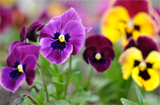Planting in November
While other states are experiencing nearly freezing temperatures in November, Florida provides cool, dry weather that is great for many plants.
You can take advantage of Florida’s weather by following these planting suggestions based on the Florida climate zones. Refer to the gardening region map to find your region.
North Florida
Bedding Plants: Try cool-season varieties such as pansy, viola, and chrysanthemum to add fall color to your garden.
Bulbs: November is the time to plant amaryllis, crinum, and daylily. You can also plant spider lily, but only in partial shade.
Herbs: Continue to plant herbs such as cilantro, dill, and sage from seeds or plants.
Vegetables: Continue to plant cool-season crops such as broccoli, carrots, and lettuce.
Central Florida
Bedding Plants: Create an autumn display with cool-season plants such as ornamental cabbage, cape daisy, and snapdragon.
Bulbs: Many bulbs (such as crinum, amaryllis, and daylily) like to get their start in November’s cool weather.
Herbs: Opt for herbs that prefer cool, dry weather—parsley, thyme, and sage are good choices.
Vegetables: Continue planting kale, beet, and other cool-season crops.
South Florida:
Bedding Plants: Plant impatiens, strawflower, and pansy to add fall colors to your garden.
Bulbs: November is a great month to plant amaryllis, crinum, and different varieties of elephant’s ear.
Herbs: An array of herbs such as cilantro, dill, and fennel (along with other cooler, dry weather varieties) can be planted from seeds or plants.
Vegetables: Gardeners in South Florida can also continue planting cool-season crops, including kale, lettuce, and carrots.
Adapted and excerpted from:
“Florida Gardening Calendar,” UF/IFAS Florida Gardening Calendar (Accessed 10/2014).

Related Sites & Articles
- Hot Topics
- Fall Allergies
- Herbs for Fall
- Vegetable Gardening
- UF/IFAS Publications
- Florida Vegetable Gardening Guide
- Compost Tips for the Home Gardener

